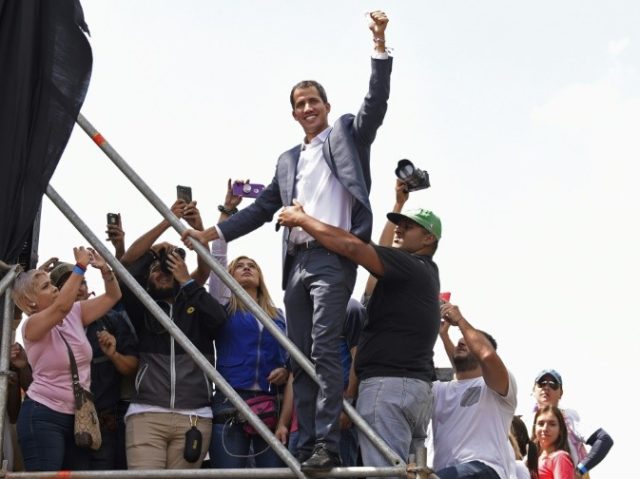Venezuela’s interim President Juan Guaidó visited Washington, DC, to meet senior Trump administration officials in December, an anonymous White House spokesperson told the Spanish newswire service EFE in a report published Wednesday.
“Representatives of the administration have spoken to Guaidó on various occasions, including during his visit to Washington in December,” the spokesperson reportedly told EFE. While President Donald Trump spoke to Guaidó last week following his inauguration as president of the country, the EFE report is the first known confirmation that high-level American officials were in touch with the opposition political leader before he took over the country.
The spokesperson did not name any of the officials who met with Guaidó, nor did he or she comment on if Guaidó met with Trump, himself. The spokesperson did clarify that Guaidó visited Washington as part of a larger tour of countries friendly to the Venezuelan opposition, including Colombia and Brazil.
Guaidó became president on January 23 after swearing an oath of office before a crowd of thousands in Caracas. Socialist dictator Nicolás Maduro has refused to leave the country’s presidential palace, Miraflores, claiming that he remains the legitimate head of state of the country. According to the Venezuelan constitution, the people have a duty to disavow a president who violates human rights or maintains power through non-democratic means; citing this constitutional demand, Guaidó noted the fraudulent nature of last year’s presidential election and assumed the presidency.
As interim president, his top priority is organizing free and fair elections.
America was among the first countries to announce that it recognized Guaidó as the president of Venezuela and not Maduro. Guaidó spoke to President Trump via telephone last week shortly before leading a protest demanding that Maduro accept he is no longer president and hand over control of the armed forces to Guaidó.
“They agreed to maintain regular communication to support Venezuela’s path back to stability, and to rebuild the bilateral relationship between the United States and Venezuela,” a White House readout of the call explained.
In the past two weeks, dozens of countries around the world have disavowed Maduro – including most in Latin America, the European Union states, eastern European nations like Kosovo and Georgia, and Australia and Israel – and recognized Maduro as president of Venezuela. Maduro’s most vocal international supporters are the governments of Turkey, Russia, and Cuba, while the communist nations of China and North Korea have expressed support for the “Venezuelan people” without specifying who they believe legitimately lead them.
Maduro has responded to the backlash by attempting to expel American diplomatic personnel from Venezuela – a move that failed because the U.S. only recognizes Guaidó’s authority to expel diplomats – and clinging to support from Turkey and Russia. As he still controls most of the military, Maduro has used his forces to imprison, torture, and kill hundreds of protesters since Guaidó’s inauguration, according to estimates from the United Nations. The Maduro regime has relied on state violence to silence dissidents for years, though it has largely abstained from targeting Guaidó himself due to immense international pressure not to do so.
Guaidó’s trip to Washington followed several similar interactions between the Trump administration and Venezuelan pro-democracy dissidents in the past two years. The New York Times accused the White House late last year of meeting with members of the Venezuelan military who sought to oust Maduro. The soldiers reportedly requested material aid such as encrypted radios to communicate and organize a coup, but Trump ultimately decided against helping them, as he found their plans too poorly coordinated to have a proper chance to succeed.
Trump has also maintained an open line to the Venezuelan refugee community in the United States and invited prominent members of the opposition to the White House. Among his first acts after taking office in 2017, Trump welcomed dissident Lilian Tintori, wife of political prisoner Leopoldo López, to Washington. López is the leader of Popular Will, the dissident party that Guaidó belongs to and helped found.
Maduro has regularly accused Trump – and President Barack Obama before him – of plotting his assassination, most recently in October.
“They have given the order from the White House that Maduro be killed, a task they have given to the oligarchy in Bogotá,” Maduro said at the time. “The government of Bogotá has been given the task of assassinating me, I denounce it worldwide. They will not even touch a single hair of mine.”
Maduro himself has, however, threatened to kill U.S. soldiers if they appear anywhere near Venezuela, a threat American officials have not made to Venezuela’s armed forces. Maduro’s regime also took an American civilian, Joshua Holt, hostage for years, claiming Holt was involved in a secret plot to overthrow the socialists on behalf of Washington. Following an international outcry triggered by protests within the prison Holt and wife Thamara Caleño were held in, Maduro released Holt last May.

COMMENTS
Please let us know if you're having issues with commenting.